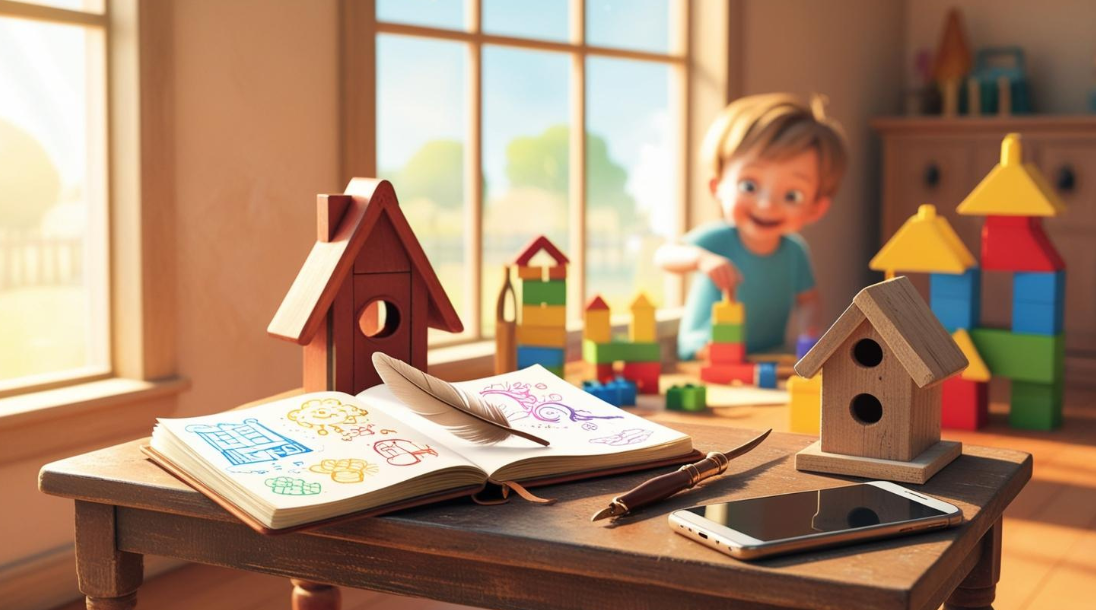A Wake-Up Call About Screen Time
The other day, I was at a family dinner, excited to catch up with everyone. But as I looked around, something felt off. My five-year-old nephew was glued to his tablet, my sister scrolled through Instagram, and even my dad, who once called the internet “witchcraft,” was watching YouTube videos. We were together, yet completely disconnected. It made me realize the importance of understanding the benefits of spending less time on technology.
Sound familiar?
Technology is an incredible tool, but overusing it can impact our relationships, health, and overall happiness. Studies show that excessive screen time is linked to poor mental health, sleep disturbances, and reduced productivity. So, what happens when we unplug and reclaim our time? Let’s dive into the surprising benefits of spending less time on technology.
1. Strengthening Family Bonds ❤️
Gone are the days of long, meaningful family conversations. Now, dinner tables are filled with texting, scrolling, and notifications. But spending less time on technology can change that.
The Science Behind It:
According to a study by the American Psychological Association, families who spend more time together without screens experience stronger emotional connections. Engaging in face-to-face conversations boosts empathy, trust, and understanding.
How to Fix It:
- Implement a “No Phones at Dinner” rule.
- Plan screen-free family activities like board games or outdoor adventures.
- Have daily check-ins to discuss highs and lows of the day.
By making these small changes, we nurture real-life relationships that last a lifetime.
2. Better Sleep 💤
Raise your hand if you’ve ever gone to bed early, only to get sucked into “one more video” or an endless scroll on social media. 🙋♂️
The Science Behind It:
Screens emit blue light, which suppresses melatonin, the hormone responsible for sleep. A Harvard study found that exposure to blue light before bed can delay sleep by up to 90 minutes, leading to restless nights and groggy mornings.
How to Fix It:
- Turn off screens at least 30-60 minutes before bed.
- Use night mode on devices to reduce blue light.
- Swap late-night scrolling for reading, journaling, or meditation.
A screen-free bedtime routine means deeper, more restorative sleep and waking up feeling refreshed.
3. Improved Mental Health 😊
Social media is supposed to connect us, yet studies show that heavy social media users are more likely to feel anxious, lonely, or depressed. Cutting down on screen time can have a huge positive impact on mental health.
The Science Behind It:
A study published in the Journal of Social and Clinical Psychology found that reducing social media use to just 30 minutes per day significantly decreases anxiety, depression, and feelings of loneliness.
How to Fix It:
- Set daily screen time limits using built-in phone tools.
- Take a social media detox for a weekend.
- Replace online interactions with real-life conversations.
Spending less time on technology leads to more peace of mind and emotional well-being.
4. More Physical Activity 💪
We often complain about not having time to exercise, but let’s be real—how much of that time is spent on our phones or watching TV?
The Science Behind It:
The World Health Organization recommends at least 150 minutes of moderate exercise per week, but excessive screen time often keeps people sedentary. Studies link prolonged sitting and screen time to obesity, heart disease, and diabetes.
How to Fix It:
- Take screen breaks every hour and stretch.
- Replace TV time with walks, yoga, or dance sessions.
- Challenge yourself to swap 30 minutes of scrolling with exercise.
Being active isn’t just good for your body—it’s a natural energy and mood booster!
5. Boosted Creativity 🎨

Did you know that boredom fuels creativity? When we’re constantly consuming content, we rarely give our brains the space to create.
The Science Behind It:
A study from the University of Central Lancashire found that boredom enhances creativity because it allows the mind to wander, leading to more original ideas.
How to Fix It:
- Replace scrolling with journaling, drawing, or DIY projects.
- Set aside screen-free hours for creative activities.
- Encourage kids to use their imagination with screen-free playtime.
The less time we spend on technology, the more creative we become!
6. Healthier Eyes 👀
Ever noticed your eyes feeling dry, strained, or tired after long screen sessions? That’s called Digital Eye Strain, and it’s becoming increasingly common.
The Science Behind It:
The American Optometric Association states that prolonged screen exposure leads to eye fatigue, blurred vision, and headaches.
How to Fix It:
- Follow the 20-20-20 rule: Every 20 minutes, look 20 feet away for 20 seconds.
- Adjust screen brightness and contrast.
- Blink more often and use artificial tears if necessary.
Reducing screen time means better vision and less discomfort.
7. Increased Productivity 🚀
How often do you check your phone while working? A study by RescueTime found that the average person checks their phone 58 times a day, leading to huge drops in productivity.
The Science Behind It:
It takes 23 minutes to refocus after being distracted by a notification. Cutting down on distractions means getting work done faster and more efficiently.
How to Fix It:
- Use focus modes or app blockers while working.
- Set specific screen-free work hours.
- Keep your phone out of reach during deep work sessions.
Less distraction = more done in less time!
8. Setting a Good Example for Kids 👩👧
Children learn by watching their parents. If we’re always on our phones, they will be too.
How to Fix It:
- Model healthy screen habits by limiting your own use.
- Plan daily screen-free family activities.
- Encourage outdoor play, reading, and hobbies.
Being present teaches kids the value of real-life interactions.
9. Deeper Friendships & Relationships 🤝
Ever tried talking to someone who kept checking their phone? It feels disrespectful and disconnected.
How to Fix It:
- Have screen-free meetups with friends.
- Call instead of texting for deeper conversations.
- Be fully present during interactions.
Less screen time = more meaningful connections.
10. Enjoying the Real World 🌎

Some of the best moments in life don’t happen on a screen. They happen when we’re exploring, laughing, and making memories.
How to Fix It:
- Take a tech-free nature walk.
- Plan a day without social media.
- Focus on being in the moment.
Life is happening outside the screen—don’t miss it!
Final Thoughts 🎯
The benefits of spending less time on technology are undeniable. By reducing screen time, you’ll experience better relationships, health, and happiness.
Try a tech detox challenge—even just one hour less per day—and see how it transforms your life.
What do YOU think? Have you tried reducing screen time? Share your thoughts in the comments! 👇
Learn more about Is Indian Parenting Good? Truth Behind the Love and Lessons
